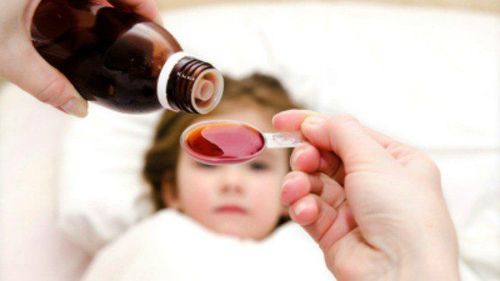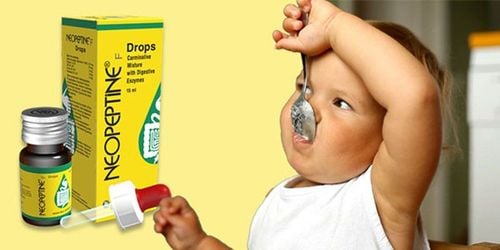This is an automatically translated article.
The article was professionally consulted with resident Doctor Ho Thi Hong Tho - Neonatologist - Department of Pediatrics - Neonatology - Vinmec Phu Quoc International General Hospital.Taking care of young children is a job that continues for several years. This is also an opportunity to begin forming a bond with the newest member of your family. Breastfeeding has been shown to improve maternal and newborn health outcomes and help control health care costs, but how long should breastfeeding last and when should parents baby food?
The age of 4-6 months is the time when babies start to get ready for solid foods, and parents often give babies traditional foods like baby cereal and some bland foods other. In fact, raw foods are not necessarily foods that are not good for children. However, using too many foods in one meal can reduce the child's important nutrients and make them anorexic, unable to feel the taste of that food.
1. How can children start with a variety of foods at an early age?
First of all, the most important thing is to make sure the child's health is healthy. In the early stages of life, babies are only exposed to breast milk or formula, but when they start weaning, the combination of many foods can cause discomfort or allergies. Experts have also advised mothers to avoid foods that often cause allergies in children such as eggs, tree nuts, peanuts, shellfish until the baby has passed their first birthday. me.Recent studies show that the advice and referral of doctors have helped mothers to prevent children from having food allergies. The American Association of Asthma-Allergy-Clinical Immunology offers advice for parents when starting to cook baby food. Parents can start solid foods with vegetables, fruit, meat or pureed cereals to check if the child reacts to the ingredients of the food. Otherwise, parents can switch to more allergenic foods like eggs and fish, but remember to wait three to five days before giving your baby the next new food. Parents should not be too worried because only a small number of children are allergic to allergenic foods, so their child's diet will not be too boring.
Besides, it is very important to prevent children from having food allergies. Mothers should be aware that family members such as siblings or children's parents are allergic to any food, often the child is also allergic to that food. In this case, parents should consult a doctor or nutritionist before introducing solids to their children. In addition, it is also advisable to consult a doctor before introducing solids or starting new foods if your baby has any of the following risk factors:
In the family, there are siblings or parents with allergies with peanuts. Eczema gets worse despite following your doctor's treatment plan. Have been diagnosed with a food allergy and had an immediate reaction to the food. Having a positive blood test for allergies to certain foods your child has not tried (blood tests for food allergies are usually ordered for children with a history of allergies)

2. No need to avoid spices
While children around the world are eating complex dishes with lots of spice and flavor, many children in the United States prefer mixed dishes without the greasy taste. Seattle pediatrician Susanna Block said: “The idea that young children should only eat bland foods is a tradition, becoming a norm in our culture even though it has no scientific basis. learn behind it”. In other words, letting children discover the food around them will not hurt them even the slightest.Let's change the atmosphere, the way children's meals are prepared, it is considered a revolution in food for children. New rules for feeding babies will help them start good eating habits throughout life. Of course, not all principles have to be changed, some tried and true principles still apply.
One more thing, parents, make sure your baby is ready for solids, and make sure your baby is 4 months old and shows signs of being ready for solids.
3. Introduction of new foods
Although the child's diet is varied, parents still pay attention to new foods. Offer each new food one at a time and wait about 3 to 5 days before moving on to the next new food. Thus, parents will easily assess whether the child has an allergic reaction to that new food or not.Common signs of allergy are: Diarrhea, vomiting, rash. If parents notice one or more of these reactions occurring within minutes or hours of their child eating a new food, they should call their child's doctor immediately. The doctor can tell you what to do if these sudden reactions are life-threatening. Especially if the child shows signs of difficulty breathing or swelling of the face and lips, immediately take the child to the nearest medical facility for timely treatment.

4. How to introduce new foods to children?
Remember that introducing new foods to your baby is not a trigger for allergies. Young children can be allergic to foods they have eaten before but have no symptoms. This can still happen if your baby is first exposed to foods made with different ingredients, such as egg or milk muffins.5. Give your child the necessary fats
Grocery store shelves are flooded with low-fat and fat-free products. However, should children eat these foods? The answer is absolutely no. “Fat is essential for a child's growth. Both breast milk and formula contain a lot of fat," says Susanna Block, Seattle pediatrician.Experts recommend giving children full-fat dairy products, such as cheese and yogurt, until 2 years of age.
Note: do not give cow's milk to babies until one year of age. Use whole milk instead
The unsaturated fat found in avocados makes it another great choice for your baby. In addition, the fats found in salmon or other fatty fish are also rich in essential fatty acids, especially omega-3, which are very good in the development of children.
Usually, babies will not be able to get used to a new type of food easily, so mothers should be patient and try to feed them many times. At some point the baby will get used to and accept that food.
6. Limit junk food

Children and nutritionist Christine Gerbstedt said: “Children's calorie needs are relatively low, but their nutritional needs are high. "Inadequate nutrition can even affect key developmental milestones in a child's life." Therefore, do not make snacking a habit of children because habits at this stage will be difficult to give up when children grow up.
7. Watch out for choking hazard
Choking is a constant danger to children and especially infants. Baby foods should be mashed or pureed, and be aware that weaning is just like any other milestone in your baby's development. Some babies may be ready for solids earlier than others.When babies get used to solid foods and can feed themselves, mothers will no longer need to puree everything but make sure to cut food into small pieces suitable for babies. Don't give your baby choking hazards like hot dogs, nuts, raw vegetables, popcorn, and other foods that may not be safe.
8. Keep your kids happy while eating

Dinner with friends and dear family is undoubtedly one of the most primal and innocent pleasures of one's life. Your baby will observe you as a model, so change your tastes often so your baby can see that your parents can enjoy a variety of foods, too.
There are a few things parents can do to make mealtimes an enjoyable experience for their children. First, make sure there's enough time to not rush through each meal, and accept the mess when your child picks up food and leaves it strewn about. Nutritionist Eileen Behan said: "Babies are learning how to eat so they're going to mess things up. But they're really learning about new tastes and smells and how to put food in their mouths." "Most importantly, they are learning that eating can be pleasurable and enjoyable." To make cleanup easier, place a floor mat under your baby's high chair and let them comfortably enjoy their meals.
When it comes to the issue of feeding babies, parents should change their thinking and learn new rules in feeding their babies to help children form good eating habits not only at the right time. that but also in the future. However, it is still important to ensure that babies start eating solid foods when they are at least 4 months old and show enough signs that they are ready.
For children to be healthy and develop well, it is necessary to have a nutritious diet in terms of quantity and quality balance. If children are not provided with adequate and balanced nutrients, it will lead to diseases of excess or lack of nutrients, which adversely affect the comprehensive development of children in terms of physical, mental and motor skills.
The period of baby eating solid foods is an extremely important period to help children develop comprehensively. Children who do not eat properly are at risk of micro-mineral deficiencies, causing anorexia, growth retardation, malabsorption, etc. If they notice the above signs, parents should supplement their children with supportive products. The supplement contains lysine, essential micro-minerals and vitamins such as zinc, chromium, selenium, and B vitamins to help fully meet the nutritional needs of children. At the same time, these essential vitamins also support digestion, enhance nutrient absorption, help improve anorexia, and help children eat well.
Parents can learn more:
Signs of zinc deficiency in children
Micronutrient deficiency and failure to gain weight in children
Please regularly visit Vinmec.com website and update useful information to take care of your child. Take care of the baby and the whole family.
Please dial HOTLINE for more information or register for an appointment HERE. Download MyVinmec app to make appointments faster and to manage your bookings easily.
Reference source: babycenter.com













